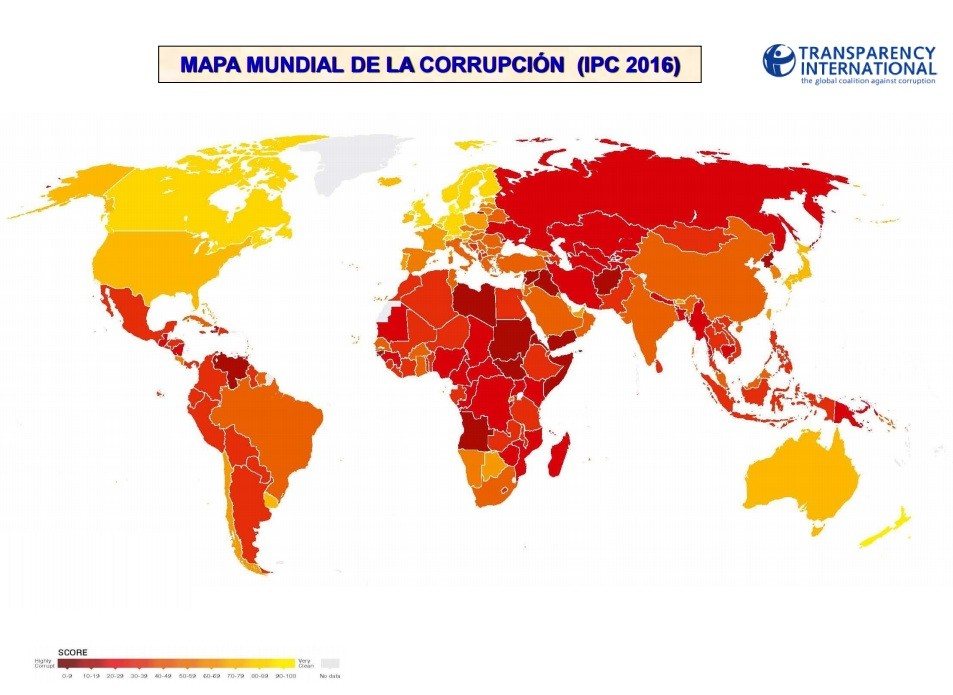
The social value of transparency and the fight against corruption: a vision from civil society
Jesús Lizcano Álvarez
The social value of transparency
In a society such as that of Spain, that can be taken into consideration to be free, participatory, and ultimately truly democratic, transparency must be a basic pillar, which must be implemented in a broad and permanent way to achieve minimum levels of social participation and economic efficiency, so that the general public are therefore not unprotected and deprived of one of their fundamental rights: the right to information, and ultimately, the right to know.

In addition, transparency makes it possible for civil society to have some control over public powers and, therefore is a fundamental tool to fight against corruption, which is a real social scourge that greatly damage social justice and economic and institutional development in a many countries in the world.
To achieve this vital social objective, there is a growing need for a truly transparent political, legal and economic system, that is, for the general public to receive, or at least have access to, faster and more detailed information on everything that happens and is decided in the various public institutions belonging to the three powers that underpin society: legislative, executive and judicial.
On the other hand, one of the most important problems in the current social context is the worrying level of corruption that exists in most countries. Corruption is a general problem in this globalised world, and therefore needs global solutions, and the politicians and leaders of each country, as well as supranational organisations, and especially civil society, must choose clearly, permanently and in a coordinated manner, to combat this central problem and economic and social burden.
In this context, we should make reference to nongovernmental organisations such as Transparency International, implemented in a hundred countries, whose main objective is to combat corruption and to promote a minimum level of transparency in the various countries that will enable the general public to be sufficiently informed and can thus participate more in the decisions that concern them.
Transparency International Spain, the Spanish chapter of IT, has been developing its activities since 2006, assuming above all that transparency is an important objective of today's society
Within this organization and in the aforementioned international context, Transparency International Spain, the Spanish chapter of TI, has been carrying out its activities since 2006, committing to above all that transparency is an important objective of today's society, and is inherently linked to the general public's right to know, who increasingly need to be sufficiently informed and have a greater degree of participation in the decisions that affect them.
Evaluation of the transparency of public institutions
Given the importance of transparency and information disclosure of public institutions, as an element of knowledge and social control, TI-Spain has been promoting and promoting this transparency through the development and publication in recent years of five indexes of transparency related to Public institutions:
- The Transparency Index of the City Councils (ITA): This Index is aimed at measuring and comparing the effective level of transparency and openness of information -an important exponent of democratic quality- of the municipalities to the general public and residents of the municipalities, and to society in general. The ITA has evaluated the transparency of the 110 largest municipalities in Spain, which together account for more than half of the Spanish population.
- The Water Management Transparency Index (INTRAG): The Transparency Index in Water Management (INTRAG) is a tool to measure and disseminate the level of information transparency of the bodies that manage water in Spain. The evaluation of fourteen Organisms, nine Hydrographical Confederations and five Autonomous Water Agencies is carried out using this Index.

- The Transparency Index of the Autonomous Regions (INCAU): This Index, similarly to the other TI-Spain Indices, has a dual objective: on one hand, to carry out an assessment of the level of transparency of the Governments of the different Autonomous Regions, and on the other hand, to promote and foster the increase of the information that these institutions offer the general public and society as a whole. This Index shows the results of the evaluation of the transparency of the seventeen Spanish Autonomous Regions, or more specifically, of the Governments responsible for these Autonomous Regions.
- The Transparency Index of Provincial Councils (INDIP): this Index shows the results of the evaluation of the level of transparency of forty-five Provincial Councils: Provincial Councils proper, Basque Provincial Councils, two Balearic Councils and two Island Councils Canaries; this has been done through an evaluation procedure similar to the one described in previous indexes, which is based on a set of 80 indicators that attempt to cover the most important areas of information that in IT-Spain consider should be made available to the general public by a Provincial Council.
- The Transparency Index of Parliaments (IPAR): This Index assesses the level of transparency of the nineteen Spanish parliaments: Congress, Senate, and the seventeen autonomous parliaments. The latest edition of IPAR (2016) presented in February 2017, shows an overall improvement in the level of transparency of the whole of the nineteen parliaments evaluated, with no parliament failing in this year (in 2014 there were three failures). While the overall average score in 2014 was 64.1, in this latest edition of the IPAR the average score was 82.2.
The previous figures show that parliaments are no longer institutions that are distant from the general public, descending from a certain peak in which they were considered to be with their high legislative tasks, to get closer to the land of Parliaments open and closest to society, which is what the general public today demand.
Parliaments are no longer institutions that are far from the citizens, descending from a certain peak in which they were considered with their high legislative tasks
The strategy chosen by TI-Spain for the start-up and effective implementation of the mentioned indexes has been eminently participatory, both in terms of the plurality of institutions that have participated in the development of the methodology and in the selection of the areas of transparency and indicators to carry out the evaluation in each Index, as well as in the promotion of the participation of the different public institutions evaluated in each of the respective Indices. It is worth mentioning in this respect the important level of collaboration that the general public institutions evaluated that was provided to TI-Spain in the process of evaluation and development of these Transparency Indices.
Evaluation of corruption at the international level
On top of this, Transparency International has periodically published four reports related to corruption: a) Corruption Perceptions Index, b) Global Corruption Barometer; c) Source of Bribery Index, mainly aimed at companies; and d) Global Report on Corruption, which describes in detail the specific situation of each of the many countries analyzed. Here is a brief description of each of them:
- Corruption Perceptions Index: A first index or report that TI presents every year is the so-called Corruption Perceptions Index (CPI), which carries out a study that is projected on most of the Countries and that measures the level of perception that the general public and institutions perceive in their own country.
In the last published CPI (2016), Spain has maintained the low score of 2015 and is therefore again 58th out of 100. This maintains the loss of two points in 2015 with respect to the 2014 CPI (in which it was 60th); The score received in 2013 was 59, with a quite steep decline, so, after observing the data for 2015, it was thought that the improvement would be resumed, but the data for 2016 have not shown this.

- Global Corruption Barometer: This Index provides a more detailed and qualified analysis by sector of the level of corruption in each country. It is therefore a broad and qualitative study, in short a good x-ray of corruption.
- Source of Bribery Index: This Index assesses the existing level of bribes in exporting companies in the 30 economies or major exporting countries of the world. This Index shows that corruption is not only a problem of the public sector, but also of the business sector, and this brings with it important financial and reputational risks for the companies concerned.
- Global Report on Corruption: This more comprehensive report addresses the state and evolution of corruption in a number of countries; This report is conducted by experts on corruption issues selected by IT in each country. We should note that the experiences and situations of greater corruption in most of the countries in terms of entities are centred on local public entities, that is to say, the municipalities, and at sector level, the most affected are: Construction, Oil, Mining and Weaponry.
The last published edition (2016) of this Global Report has been dedicated specifically to Sport. The report gathers a broad x-ray of corruption in sport at the international level, through a set of articles and studies of more than 60 authors, which analyze the situation relative to a large number of sports and countries. In short, it is an in-depth report that compiles many of the facts and causes of many corrupt activities around world sport, as well as the measures that can be taken to reduce this high level of corruption.
Proposals of Transparency International Spain to combat corruption
The great concern of the general public as regards corruption in this country makes it imperative that strong legal and institutional measures be taken to combat this social scourge. To this end, TI-Spain has been actively involved in the preparation and submission of proposals to prevent and combat corruption to political parties and parliamentary groups. In this regard, it is worth mentioning some of the proposals that this organization has established as necessary and urgent:
- Promote the depoliticization of constitutional bodies and significantly reduce the excessive and unbalanced power of political parties in relation to society and the general public.
- Reduction in the number of pensioners (no country in Europe has as many pensioners as Spain), as well as the characteristics of pension, limiting it exclusively to the activities and actions related to the corresponding public position.
- Legal prohibition of the possibility of granting pardons for corruption. It is important that the corrupt ones eventually realise that they will not have any future possibility of a legal remission of their crimes through the figure of the pardon.
The great concern of citizens for corruption in this country makes it imperative that strong legal and institutional measures must be taken to combat this social scourge
- Significant decrease in political patronage, decreasing to this effect the huge number of free designation offices in this country.
- Improve various legal provisions in the sanctioning area, including for this purpose the crime of illicit enrichment, as well as the development of a specific regime of infractions and sanctions in the Transparency Law.
- Urgent approval of the Transparency Law Regulations, still pending more than three years after the publication of the Law.
- Publication of a Law to protect whistleblowers: so that the general public feel legally protected when they discover facts and wish to file complaints for fraud and corruption.
- Regulation of Lobbies: It is necessary that lobbies are regulated from a legal point of view, social transparency is fostered, and the establishment of registries of interest groups in different public and parliamentary institutions should be mandatory.
- Transparency of political parties: we need to increase the transparency (both external and internal) of Parties and their perimeter entities (Foundations, and so on), thus following the recommendations of GRECO (Group of Council of Europe against Corruption). Transparency International Spain is starting a third evaluation that is broader than the two previous editions (now with thirty indicators, instead of ten) of the transparency of the Parties, to encourage and contrast as a civil society this necessary informational opening of political formations.
- Transparency of political parties: we need to increase the transparency (both external and internal) of Parties and their perimeter entities (Foundations, and so on), thus following the recommendations of GRECO (Group of Council of Europe against Corruption). Transparency International Spain is starting a third evaluation that is broader than the two previous editions (now with thirty indicators, instead of ten) of the transparency of the Parties, to encourage and contrast as a civil society this necessary informational opening of political formations.
- Elimination of the discretionary and opaque system of free designation of Secretaries, Auditors and Treasurers in Local Administrations, basing their designation on the principles of publicity, merit and capacity, to avoid that they are elected by those holding the elected positions they themselves will audit.
- Education: Political parties and parliamentary groups need to understand, and work towards this, that the most effective solution in the medium and long term is to prevent corruption through the general public' education, and to encourage different educational levels, introducing concepts and subjects related to ethics, values, transparency, integrity and prevention of corruption.
Although all of the above are quite important, the most urgent in any case and the first thing of all to tackle should be that the political parties worthy of what the general public expects of them, and what they have long been asking for, not stopping until forming a true pact against corruption: a comprehensive and detailed pact, which in a consensual and consonant way, allows the citizen's will to be carried out, to combat this social scourge in an effective and efficient way, at legal, institutional and social level.









